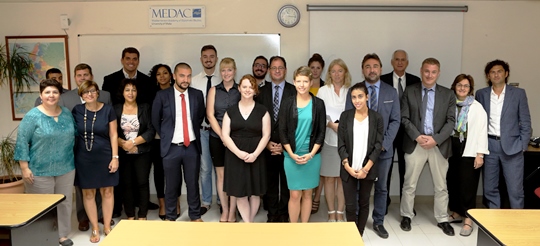
Celebrating the 6th year of its operation, the Dual Master’s Degree in Conflict Resolution and Mediterranean Security, offered by SCAR in cooperation with the Mediterranean Academy of Diplomatic Studies at the University of Malta, is hosting a diverse group of 14 students for the 2015-2016 academic year. Coming from 7 different countries, the group includes students with different disciplinary backgrounds ranging from political sciences, economics, and anthropology to applied psychology, philosophy and environmental geography. More analytically, the students comprising this year’s cohort are:
Ali Albrecht, Germany (BA in Communication)
Chadi Asli, Belgium (BA and MA in Political Sciences)
Charles Calleya, Malta (BA in International Relations)
Morgan Cloud, US (BA in Anthropology)
Monika Fallon, US (BA in English)
Brenna Fitzpatrick, US (BA in Philosophy)
Mouna Keune, Morocco-Germany (BA in Global Affairs)
David Lanigan, US (BA in Applied Psychology)
Mark Miceli, Malta (BA in Economics, MSc in Management Studies, MA in Marketing Communications)
Foeke Postma, Netherlands (MA in International Relations)
Amanda Rauh, US (MA in Cultural ANthropology)
Delphine Robert, France (BA in Environmental Geography)
Ava Stone, US (BA in International Relations, Social Justice)
Frank Talbot, US (MA in Classics)
Since September 2015 the group, which is based in Malta, has embarked on a wonderful academic journey centered on a combination of innovative curricular components, including academic seminars and lectures, elicitive educational activities and role-play simulations, guest lectures, and hands-on projects. Students also have the opportunity to get outside the classroom and engage with key local and international actors through their participation in international conferences and meetings, field trips, and research projects. Among others, throughout the Program group members get connected with civil society activists working on issues of human rights and social justice, as well as with professionals from international organizations operating in Malta in a number of sectors, such as the UN High Commissioner for Refugees and the International Committee of the Red Cross. Highlights of the year include the group’s meeting with H.E. the President of Malta, Marie-Louise Coleiro Preca at the San Anton Presidential Palace; and participation in an OSCE conference on the Helsinki +40 process, hosted by the Mediterranean Academy of Diplomatic Studies. The students also attended two lectures delivered by SCAR professors and Dual Program board members, Prof. Richard Rubenstein and Prof. Susan Hirsch, hosted by the Maltese President’s Foundation for the Wellbeing of Society. Prof. Rubenstein talked about Europe’s current migration crisis and Prof. Hirsch explored the question of strong language as we approach and discuss deep differences, with both lectures reaching a broad audience.
These ‘outside the campus’ learning opportunities reflect the overall Program approach which is informed by the notion of engaged scholarship: an open dialectic between the academic space and social actors at different levels, geared towards knowledge sharing, cross-fertilization of ideas, and amalgamation of practical and theoretical insights. These activities have offered group members a close-up view on issues related to conflict, peace, diplomacy, and economic, intercultural, and political dialogue in this strategic location in the Mediterranean Sea.
A key Program component this year has been the Collaborative Research Project on issues related to migrant integration in Malta, a topic of immediate regional interest. Divided into small groups, students conducted systematic research on a number of areas related to the integration of migrants in the country. Through the collaborative research project students got the opportunity to work as a group developing a collaborative ethos; engage in actual social scientific research; and get exposure to key contemporary issues of social concern.
Over the past months, this vibrant group of young conflict analysts has formed a living academic community –an environment conducive to furthering personal and professional positive transformation. Each member has made their own unique contribution to the growth of this community and we are very much looking forward to more learning opportunities, as this year-long intense program progresses through its second and third semesters.

